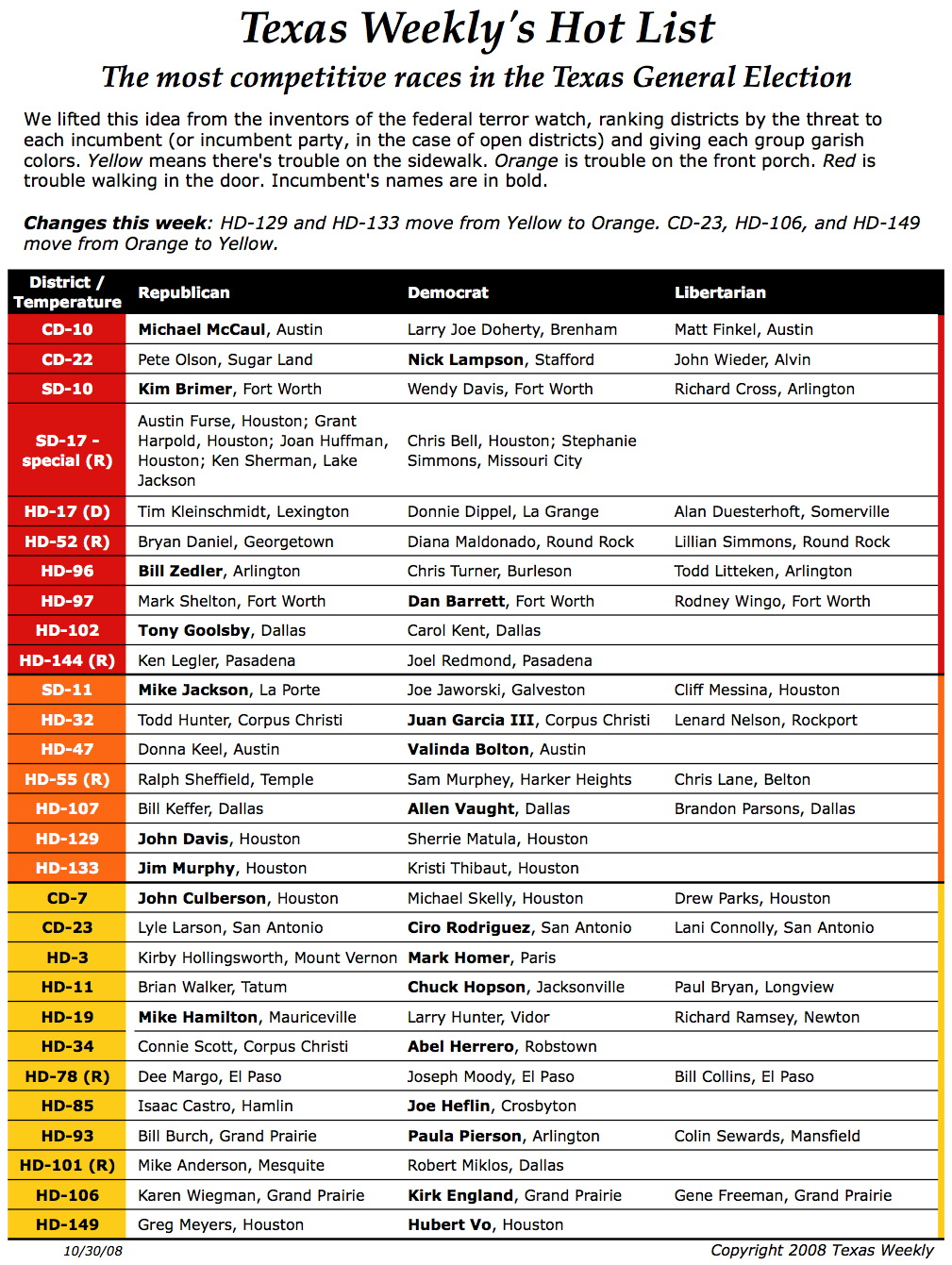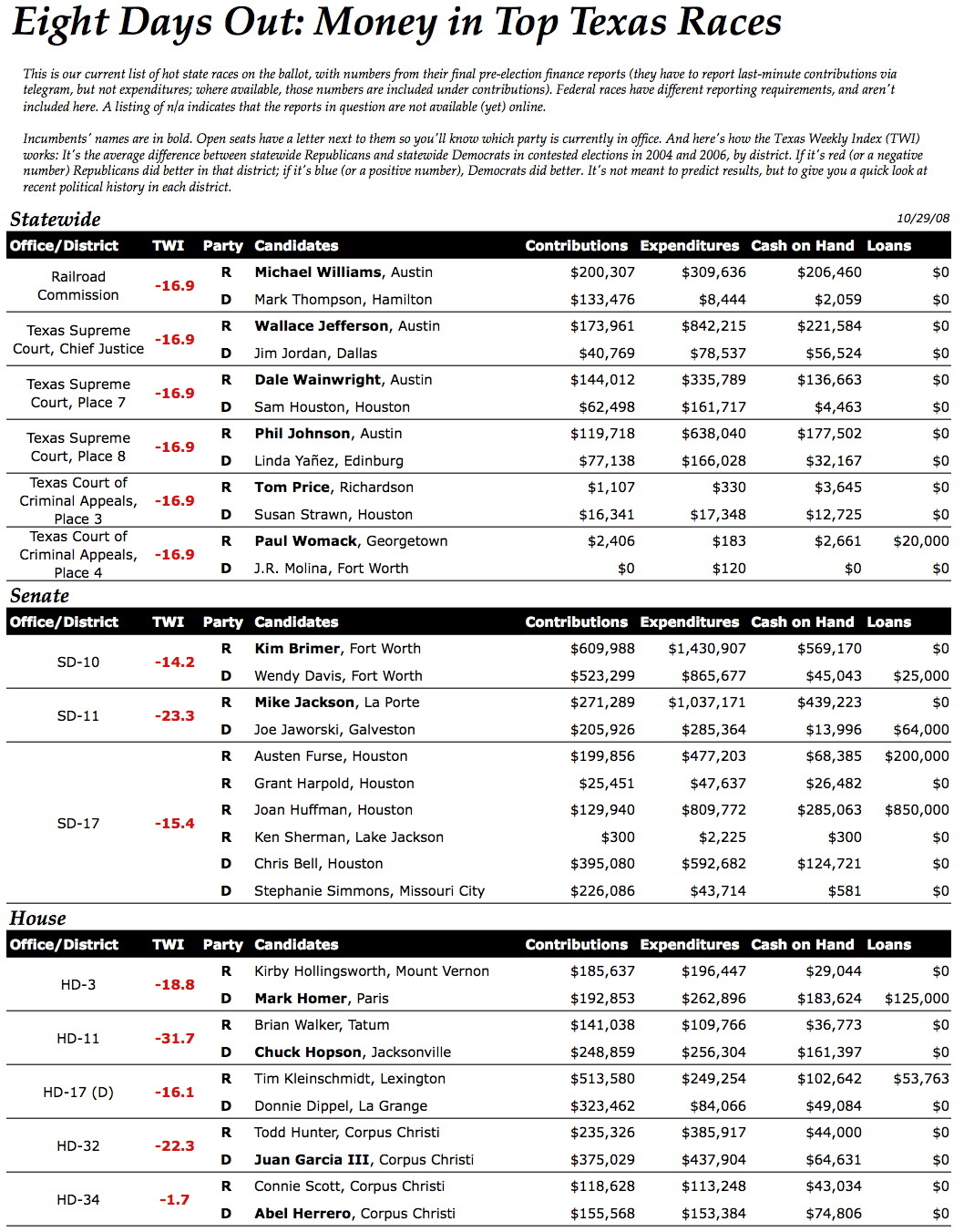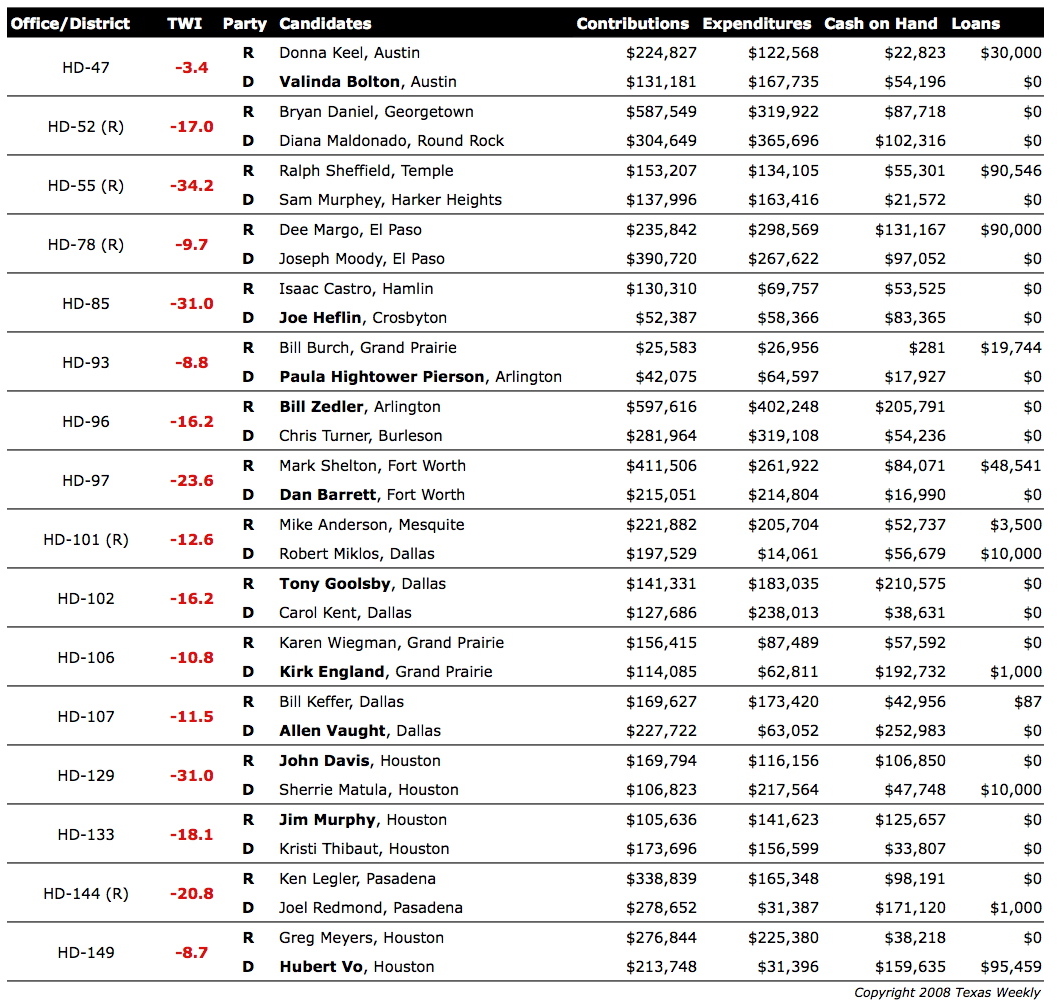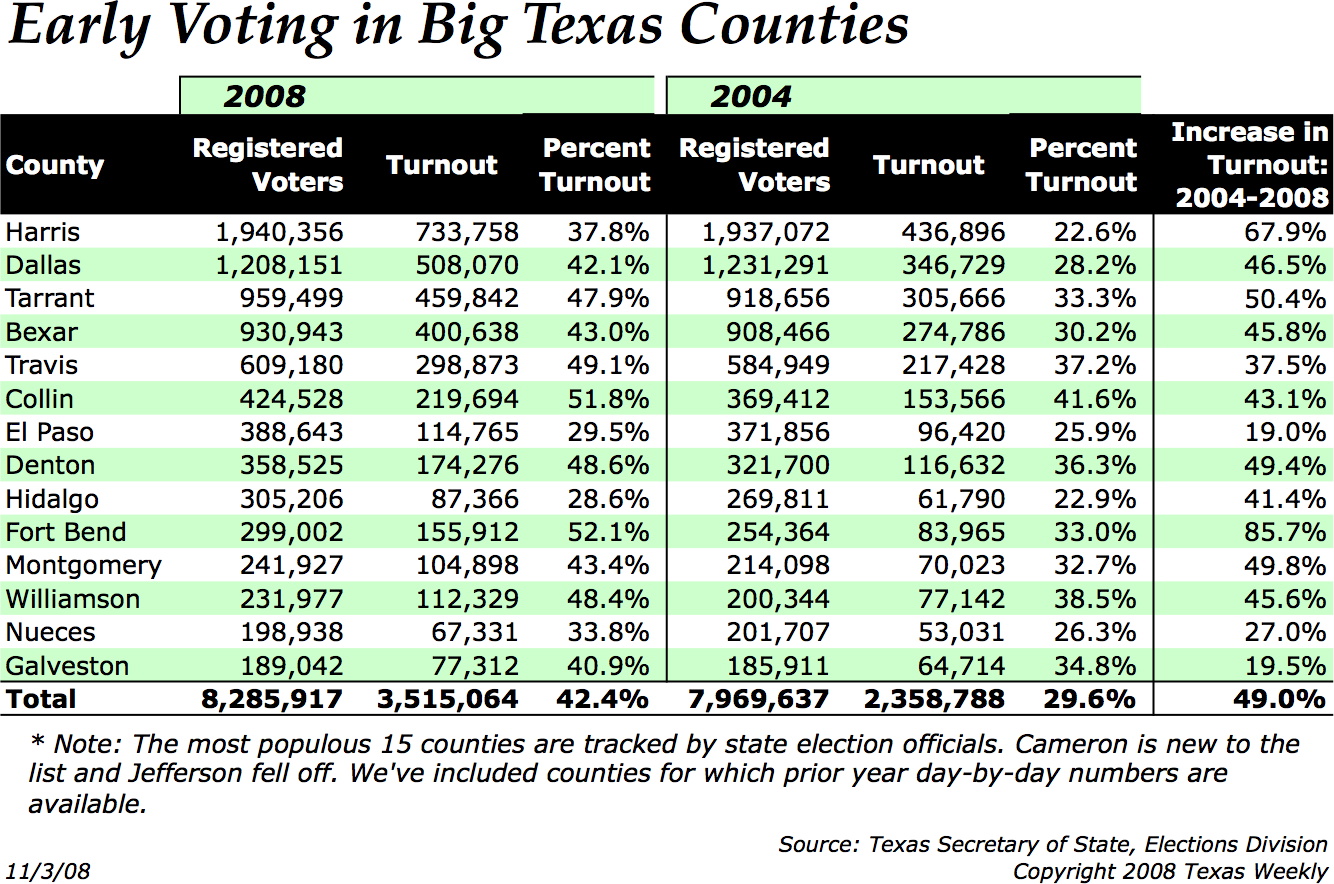Money Shot
The dollars in Texas political races tell you what the moneyed folk are interested in: They're interested in the Texas House.
Lookit: Railroad Commissioner Michael Williams, a Republican, raised more than any other statewide official outside of the race for U.S. Senate. In his most recent report, his donors gave him $200,307. Do a quick back-of-the-envelope count on legislative races and you'll find at least two dozen where either the Democrat or the Republican or both brought in more money than that. Three Republican House candidates — Rep. Bill Zedler of Arlington and open-seat candidates Bryan Daniel of Georgetown and Tim Kleinschmidt of Lexington — each pulled in more than $500,000 in the last 30 days. Together, they brought in $1.7 million in October.
Not to take anything away from anyone, but that's not really about Daniel, Kleinschmidt, and Zedler. What's at stake is control of the House. Republicans have 79 seats now (including two open seats where Republicans resigned) to the Democrats' 71. Flip four seats and you've got a tie (and a treat for political pinheads). Flip five and it's a Democratic House. Flip one or two or three, and you've probably got a contested race for Speaker of the House.
So it's only fitting that the biggest single political donor on the Republican side in October was House Speaker Tom Craddick, who'd like to keep that position for another two years.
In 21 House races we're tracking, the candidates raised a total of $9.4 million, spent a total of $7.6 million, and had $3.5 million left to play with during the remaining week of the campaign. If you didn't have your calculator handy, that's an average of $449,178 in contributions, $362,838 in spending, and $169,689 on hand.
That turns into mail and broadcast advertising, consultants, getting out the vote. And if you look through the charts, you'll see what races the political financiers decided were in need of late money and which ones weren't, either because the contestants are duds or because one side or another has put the race away.
The race for speaker is well under way, with Republicans talking about who might succeed Craddick and Democrats talking about that, and about which of them might win the corner office if there's an earthquake on Tuesday and the Republicans are no longer running the House.
Some possible plot lines:
• Republicans hold steady or pick up seats on Tuesday. Craddick probably wins reelection.
• Republicans loose a couple of seats but retain partisan control of the House. Craddick would be in trouble, and he's got two groups breathing on him. The first is known in Austin as the ABCs, for Anybody But Craddick. The second group includes Republicans who'd like a change in management but don't want to reveal themselves until they're sure it's going to happen. A candidate from the first group would get his or her fellow ABCs and most of the Democrats in the House, who also seek Craddick's defeat. A candidate from the second group would argue that a Republican speaker should have a majority of the House's Republicans and not just renegades who've cut a deal with the other party.
• Tie, with 75 Republicans and 75 Democrats. Craddick's out, and it's time for a coalition candidate who can get enough Democrats and Republicans to get a majority. Outsiders will be looking at party affiliations; House members will be looking at their relationships, trying to figure out which new speaker would give each of them the best deal, whether it be a chairmanship, a great office, parking space or whatever.
• Democrats win a net of five or more seats. The Republicans are all out of the running and the Democrats have to work their funky math. This time, the two groups are the Craddick D's — Democrats who've been supporters and lieutenants of the current speaker — and Democrats who've been chafing since he won the job in 2003. And the questions are similar to those in a narrowly Republican House: Do you get a Democratic speaker elected mostly by Democrats, mostly by Republicans, or with a more even mix.
The potential challengers on both sides are apparently playing nice, staying in contact and trying to ignore outside noise from lobbyists, reporters, and other pests. An effort to knock off Craddick two years ago failed, in part, because his opponents couldn't settle on a challenger (and in part because he outmaneuvered everyone else). There are a handful of real and potential candidates on the Republican side (Byron Cook of Corsicana, Dan Gattis of Georgetown, Delwin Jones of Lubbock, Jim Keffer of Eastland, Edmund Kuempel of Seguin, Jim Pitts of Waxahachie) and more on the Democratic side (Craig Eiland of Galveston, Pete Gallego of Alpine, Scott Hochberg of Houston, Richard Raymond of Laredo, Allan Ritter of Nederland, Senfronia Thompson of Houston, Sylvester Turner of Houston).
Once they know Tuesday's results, they might keep singing "Kumbaya." Or this could look like one of those water polo matches in the Summer Olympics that ended with blood in the water.
The Final Hot List
As the campaigns enter these last weeks, we rate the chances of party changes in top congressional and statehouse races. We lifted this idea from the inventors of the federal terror watch, ranking districts by the threat each incumbent (or incumbent party, in the case of open seats) faces, and giving it a garish color. Yellow means there's trouble on the sidewalk. Orange is trouble on the front porch. Red is trouble walking in the door.
Republican consultants, sobered by bad news on the national front, still say they'll sweep the statewide seats in Texas, hold off Democratic challengers in two congressional seats and knock off a Democrats in Congress, hold onto all three contested state Senate seats, and gain one seat in the House, ensuring another two years with the GOP in control of all statewide offices, the congressional delegation and both chambers in the statehouse.
Democrats enter the final stretch with what, in a different context, was called irrational exuberance. It's difficult to find any takers on most of the statewide seats, but they're optimistic about a couple of judgeships. The congressional assessment is a straight flip, with the Democrats thinking they'll hold off the serious challengers and knock off the Republicans in two more. They remain optimistic about two of the three hot Senate races, and they think they might pick up enough seats in the House — it would take a net of five — to regain the control they lost after redistricting in the 2002 elections.
We find Republicans and Democrats alike who think the changes in the Texas House could be large enough to threaten the tenure of Speaker Tom Craddick.
Write these starting numbers at the top of your scorecard. After the 2006 elections the Republicans had 19 members of the 32-member congressional delegation, 20 of the state's 31 senators, and 81 of the state's 150 House members. Since then, the Democrats picked up two House seats, from a special election a year ago and from a party switcher who got fed up during his first legislative session last year and left the GOP for the Democrats. Next week, you can record the changes.
A Booming Part of the Economy
He was gravely ill, but Dallas lawyer Fred Baron, who died this week, gave nearly $1.5 million to the Texas Democratic Trust on October 7, leading the list of contributors to Texas campaigns and committees in the latest finance reports.
Baron's contribution is by far the largest reported so far for the period between September 25 and this past weekend. Second, as we've mentioned, was House Speaker Tom Craddick, who gave nearly three-quarters of a million to Stars Over Texas PAC and the Texas GOP. Campaigns have to file these "8-day reports" the week before the election; after that, they have to report contributions, but not expenditures, for the last week. The final accounting won't be public until January, when all candidates and officeholders have to file reports on their political finances.
Baron made two contributions to the Trust PAC, one of $1,471,000 on October 7, and another of $26,000 on October 22. Only two others gave during the month to the TDT: David Mincberg of Houston gave $300,000 and Aimee Boone of Austin — the Texas Democratic Party's finance director — gave $50,000. The PAC spent $2.1 million during the month, including a $300,000 contribution to Houston's First Tuesday PAC (four days after the contribution from Mincberg, who's running for Harris County judge). The PAC gave $170,675 to the House Democratic Campaign Committee.
The Trust, which has been the largest funder of the Texas Democratic Party for the last few years, won't lose that reputation soon: It gave the party several contributions totaling $1,502,759 (The party's 8-day report wasn't immediately available).
• The Texas Democratic Party brought in $3.5 million (much of it from the Democratic Trust). The Texas GOP brought in $1.3 million (and another $683,176 in their first two telegram reports).
• The Texas Parent PAC, targeted at public schools in general and at opponents of publicly funded vouchers for private schools in particular, raised $404,428 ($390,000 of that from Charles Butt of San Antonio) and spent $425,074 during the month. That group's report lists ten candidates it supports, all Democrats.
• Texans for Lawsuit Reform raised only $202,500, but spent $1.9 million on candidates and committees. Texans for Insurance Reform, a PAC affiliated with the Texas Trial Lawyers Association, raised $498,050 (and $40,000 more in telegram reports).
• Stars Over Texas, which gives to Republican House candidates and incumbents, raised $853,000. The House Democratic Campaign Committee raised $720,789 for similarly situated Democratic candidates.
• The Blue Texas PAC didn't bring much in during the month, but that relatively new committee spent $445,025 on Democratic candidates for the House (roughly what it spent in the last report).
• The First Tuesday PAC, aimed at Harris County Democratic efforts, raised $860,000 during October.
Some of that money overlaps, with this PAC giving to that one and so on, but you get the idea. There's no economic trouble evident in Texas politics this year. Republicans and Democrats poured millions into state races during the last 30 days, including nearly $10 million into Texas House contests. Here's how candidates did in some top races.
I Spy
Republicans and Democrats are sparring over a GOP mailing that published the Democratic candidate's Social Security Number. The piece came from the GOP on behalf of Tim Kleinschmidt, who's challenging Democrat Donnie Dippel for the seat left open by Robby Cook, D-Eagle Lake.
The mailer attacks Dippel for having filed for bankruptcy 19 years ago. It's covered with tax information for both Dippel and his wife — and includes Social Security numbers. Although someone tried to black them out, the Dippel campaign says if you hold the mailer to a light, you can see both numbers easily. Dippel might or might not have a legal case since there was an attempt to hide the numbers. But the political case is open: the Democrats say it's a no-no.
(History lesson: Something similar happened during this year's GOP primary in Pasadena's HD-144. Ken Legler, the eventual victor, sent a mail piece attacking his opponent Fred Roberts. It included Roberts' Social Security number, and he apparently filed a police report and enrolled in an identity protection program.)
"It's impossible not to see that," says Hector Nieto, spokesman for the Texas Democratic Party. "For them to say that this was just a mistake or an accident is just a little misleading. It's just wrong, putting a candidate and his family in danger of being a victim of a crime. It shows a new tactic, a new low in the Republican Party."
"With graphics like that, a black marker won't cover it up," says Jeff Crosby, Dippel's consultant. "It's easy to get rid of them, you just go in and Photoshop them."
The GOP, which paid for the mailer on Kleinschmidt's behalf, isn't worried.
"I'm holding it up to all kinds of light," says Hans Klingler, spokesman for the Texas GOP and architect of the mail piece, "and I don't see it."
Klingler says the real issue is that when Dippel filed for bankruptcy, he left taxpayers and creditors with the burden.
"This was to alert the voters to know that this individual wants to make decisions with hundreds of billions of dollars of taxpayer money, which as a lobbyist he knows about, when he has a checkered taxpayer history," he says.
Dippel's version: He was building a house, and before it was finished, the builder split and took the cash. Wanting to avoid foreclosure, Dippel filed for bankruptcy. He eventually finished the house, which is in La Grange, and lives there now with his family.
But the Kleinschmidt campaign, though consultant Eric Bearse, says there's more to it. According to their research, Dippel was in debt from his mortgage, and when the bank sued him to collect, Dippel countersued on the grounds that the builder wasn't finished — but he lost and that's when he filed for bankruptcy.
Bearse says the claims should help his client.
"Certainly a lot of people have been thru difficult financial times," he says, "but those people aren't asking voters to elect them to the Texas House and watch over their tax dollars. This is something that voters need to know. He mismanaged his own money and now he's asking him to let him mismanage their money."
Crosby admits his client's long-ago bankruptcy might have some resonance with voters.
"But when voters are told it was 19 years ago, and they hear the story... it seems like a low, dirty shock from Kleinschmidt."
Another Kleinschmidt mailer caused some groans last week. Democratic blogger Rachel Farris of mean rachel was livid when she saw that Kleinschmidt used her photos of Dippel on a mailer without permission. She took the photo at a rally for Dippel, CD-10 candidate Larry Joe Doherty and Bastrop County judicial candidate Chris Duggan. The Kleinschmidt camp sent a mailer aligning Dippel with Democratic presidential nominee Barack Obama, with the photo of Dippel posing by Farris's Obama plates. Although her blog has a copyright disclaimer, a lawyer told Farris the mailer is considered "fair use" because it doesn't serve a commercial purpose.
"The people who produce the mail piece are making money," argues Farris, who laments that she doesn't really have time or money to do much more about it than post a complaint on her blog.
The kicker? Take another look at the bankruptcy mail piece — it's Farris' photo, with the car and the sign cropped out.
—by Karie Meltzer
Early Voting, Day 10: Approaching 3 Million
More than 2.7 million voters in the state's biggest counties cast their ballots in the first ten days of early voting, according to the Texas Secretary of State. That's a 55 percent increase over early voting at the same point four years ago, and each of the top 14 counties is seeing a voting boom. Fort Bend and Harris counties still lead the big county ballot boom with El Paso County bringing up the rear. Early voting continues through Friday.
Texas in the Red
John McCain leads Barack Obama and John Cornyn leads Rick Noriega in a fresh poll of state voters by the Texas Politics Project and Department of Government at The University of Texas at Austin. They've got the Republican leading the presidential race 51 percent to 40 percent, and the incumbent Republican leading the race for U.S. Senate 45 percent to 36 percent.
Bob Barr, the Libertarian candidate for president, has the support of 1.5 percent of those surveyed. Yvonne Adams-Schick, the Libertarian candidate for U.S. Senate, had 5 percent.
Some high points:
• In a hypothetical matchup, the Texas respondents said they'd vote for Republican Sarah Palin for president (51 percent) over Democrat Joe Biden (43 percent).
• President George W. Bush's approval rating in Texas, according to this survey, is 36 percent. Gov. Rick Perry's is 38 percent. But their negative ratings varied more, with 50 percent having a negative view of the president and 39 percent having a negative view of the governor.
• More than a fifth — 23 percent — think Obama is a Muslim, while 46 percent identified him correctly as a Protestant.
• The poll used "feeling thermometers" to measure voter responses to various state and national figures; U.S. Sen. Kay Bailey Hutchison got the highest score there, ahead of the president, the presidential and Senate candidates, and the top three state officials.
• Three-fourths of those surveyed disapprove of Congress' handling of the economy and energy.
The survey was done on the Internet during October 15-22. It included 550 registered voters with a margin of error of +/- 4.2 percent. Details of this and a previous poll in July are on their website.
The Buddy System
You'll find some policy and some politics in Gov. Rick Perry's speech last week to the Texas Taxpayers and Research Association.
Policy? What he's thinking about the state budget (he's no longer talking about a rebate to state taxpayers, but about the "two significant storms," i.e., Hurricane Ike and whatever you want to call Wall Street's mess), property appraisal reform, the state's business climate ("If you're a business person and you're staying in California, it's for some reason other than your bottom line"), and budget transparency.
Politics? His speech — you can see this in the first minutes of the video, now on his website — started with effusive praise for Democrat John Sharp, a potential candidate for U.S. Senate if and when Kay Bailey Hutchison gives up her post. (They were friends in college and beyond. They ran against each other in a tough race for Lite Guv in 1998. They made up and Sharp helped Perry pass the margins tax bill in 2006.)
The conventional wisdom in Austin, if you can call it that, is that Hutchison will quit early to run against Perry for governor and that she might resign before next summer. If that happens, Perry will appoint her replacement and call a special election. And Perry's appointee would have to run against a pack that includes Sharp, who's now got a video of the Guv's high praise, should he need it.
• 13.5 million. That's the number of registered voters in Texas, according to Secretary of State Hope Andrade, up from 12.7 million in the primaries and 13.1 million in the general election two years ago (and in the 2004 general election). Voter turnout in 2004 — the last presidential election — was 56.6 percent. If you extrapolate that to this year's registration numbers, about 7.6 million Texans will vote this year. Caution: That's not a number from the SOS; they'll make their turnout projections sometime between now and Tuesday. Through the close of voting on Monday, more than 2 million Texans had voted in the state's top 14 counties.
• Rep. Jim Keffer, R-Eastland, served notice that he's still in the race for speaker (he's one of a handful who've actually filed papers saying they're running), and he said in a press release that he'll be set up for business when the polls close: "Within 24 hours of the polls closing after Tuesday's historic election, I predict there will be a new consensus choice for Texas House Speaker."
• The House unanimously passed a resolution at the end of the last session — when nobody was paying much attention — that prevents a sitting speaker of the House from collecting pledges from members seeking their vote for another term. A spokeswoman for House Speaker Tom Craddick says the resolution isn't binding.
Political People and Their Moves
Rep. Corbin Van Arsdale, R-Tomball, is going to work for the Associated General Contractors-Texas Branch next week. Van Arsdale, who lost the Republican primary to Allen Fletcher in March, will be AGC's vice president and general counsel.
Gov. Rick Perry named Dr. George Willeford III, founding partner of Austin Gastroenterology, to the Texas Medical Board.
And the Guv named Rolando Pablos, a San Antonio attorney, as presiding officer of the Texas Racing Commission.
Deaths: Fred Baron, one of the nation's most successful trial lawyers and more recently, the biggest single financier of Democratic politics in Texas. He was 61. Baron had been battling cancer with the help of experimental drug treatments. He founded the Baron and Budd law firm, amassing a fortune winning asbestos and other toxic tort cases. And in the last few years, he put up millions to jump-start the moribund Texas Democratic Party, funding research, candidates and party-building efforts that, among other things, have helped Democrats bring the Texas House close to party parity. He was also the national finance chairman for presidential candidate John Edwards and made headlines this summer when he admitted sending money to Edwards' former mistress to help relocate her to California. Details on services aren't yet available, but family and friends are planning to hold a memorial Monday in Dallas.
Anthony Sadberry, the executive director of the Texas Lottery died today after a long illness. He was 59. Sadberry was appointed to the Texas Lottery Commission in 1993 by then-Gov. Ann Richards and served until 2001 (including a stint as chairman). He returned as the lottery's executive director in 2006. He was an attorney in the Houston offices of New York City-based Epstein, Becker and Green.
Quotes of the Week
Rep. Tony Goolsby, R-Dallas, asked by the Associated Press for details of an expensive taxpayer-funded renovation of the Texas House member's lounge: "I'm up to my ass in a damn campaign. This is the only job I've got and I'm trying to save it. Obama's got people coming from the rafters."
Rep. Craig Eiland, D-Galveston, quoted by The Dallas Morning News on the election prospects: "Everybody's excited, and the number one goal is to get a new speaker. The number two goal is to get a new speaker, and the number three goal is to get a new speaker. So all everybody has to remember is goal number one."
Sen. Eddie Lucio, D-Brownsville, on rumors that he might run for comptroller in 2010: "Right now, I'm just preparing myself for the next session. But people have asked me if I'm interested in running and I'm not ruling it out. There's no exploratory committee or anything like that. But my son [Rep. Eddie Lucio III] must have heard something about it and he said, 'Dad, if you're thinking about moving up or retiring, I sure hope you let me know, give me a heads-up.' I said, 'Hold on, son. I've still got some miles to go.'"
Lori Washburn, the wife of John Washburn, who won a James Madison award from the Freedom of Information Foundation of Texas for trying to stop Gov. Rick Perry's weekly destruction of government emails, in the Austin American-Statesman: "Activists are easy to admire, but they're very difficult to live with."
Texas Weekly: Volume 25, Issue 42, 3 November 2008. Ross Ramsey, Editor. Copyright 2008 by Printing Production Systems, Inc. All Rights Reserved. Reproduction in whole or in part without written permission from the publisher is prohibited. One-year online subscription: $250. For information about your subscription, call (512) 302-5703 or email biz@texasweekly.com. For news, email ramsey@texasweekly.com, or call (512) 288-6598.
Texas Tribune donors or members may be quoted or mentioned in our stories, or may be the subject of them. For a complete list of contributors, click here.
Information about the authors
Learn about The Texas Tribune’s policies, including our partnership with The Trust Project to increase transparency in news.




/https://static.texastribune.org/media/profiles/ramsey-ross_TT.jpg)